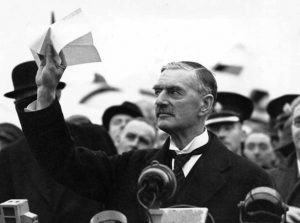1935-1939
Autumn 1939 (Age 65)

Winston Churchill, Parliament Square, London © Sue Lowry & Magellan PR
March 12, 2015
Churchill now faced his second major war with Germany as First Lord of the Admiralty. On his return to his old Admiralty office he found the same charts he had used when he left in May 1915 with the locations of the ships still intact.
Consistent with his previous behaviour, Churchill was a very active leader. He wrote voluminous memos to everyone, giving, instructions and opinions, or asking for their comments. He often ended with “pray inform me” or “pray send me.” These minutes quickly became known throughout the Admiralty as the “First Lord’s Prayers.”
He involved himself in almost every issue – production of dummy ships for naval harbours, the neutrality of Eire, the return of the Duke of Windsor. His colleagues were often overwhelmed by his energies and one, remembering Churchill’s The World Crisis remarked: “He is writing his new memoirs.”
But he was convinced that Britain must not be hesitant in its efforts to win the war and, as part of the Land Forces Committee, he recommended an Army of 55 divisions by 1941 with 20 divisions ready to stand beside the French by the spring of 1940. Critics charged that an Army this size would inhibit development of the Air Force and Navy. Churchill defended his position with the comment: “Pardon me if I put my experience and knowledge, which were bought, not taught, at your disposal.”
Although some saw him as too impulsive or too much a flagwaver, the public saw him as the only person who could rouse the nation to fight. He was clearly the backbone of the government. Thus he was much chagrined and distressed to hear that his close friend “Bendor,” the Duke of Westminster, had stated that the war was really part of a Jewish and Masonic plot to destroy Christian civilization.
Mid-September brought the bad news that the Soviet Union had occupied Eastern Poland. But Churchill reminded Lord Hankey that “this is not the first firm that Russia has defected. ” Churchill also saw an advantage in that it would require 25 German divisions to watch the Russians on the eastern front and he was certain the eventual war in the Balkans would result. In an early broadcast he told his listeners that “I cannot forecast to you the action of Russia. It is a riddle wrapped in a mystery inside an enigma; but perhaps there is a key. That key is Russian national interest. ” On the western front he anticipated one or more of the following moves by Hitler: an attack on France through Belgium and Holland; an air attack on British factories and ports; or a peace offensive.
He received a most unusual letter from the President of the United States. “What I want you and the Prime Minister to know is that I shall at all times welcome it if you will keep me in touch personally with anything you want me to know about.” With Cabinet approval, thus began some of the most famous correspondence in history, and an alliance absolutely critical to final victory.
Incredibly, Churchill found time to pursue his work on A History of the English-Speaking Peoples. F.W. Deakin, Alan Bullock and Maurice Ashley wrote the drafts but the final versions were always Churchill’s. Undoubtedly this work gave him respite from his many pressures but he also drew lessons and inspirations from history in facing his tribulations. He has written that “writing a long and substantial book is like having a friend and companion at your side, to whom you ran always turn for comfort and amusement, and whose society becomes more attractive as a new and widening field of interest is lighted in the mind. “
There were many naval engagements during the early months of the war. The loss of the aircraft carrier Courageous in the North Sea and the battleship Royal Oak to a submarine while at anchor in Scapa Flow were merely the most dramatic of many defeats. But the year ended in triumph when the British cruisers Exeter and Ajax and Australia’s Achilles destroyed one of the greatest ships in the German fleet, the pocket battleship
On November 30 Churchill was sixty- five. To some he was too old, but his longtime friend, Lady Violet Bonham Carter wrote: “You need no blood transfusions, unlike some of your colleagues.” As a military secretary, Sir Ian Jacob, would later comment: “Winston’s mind was so immensely active that he could only be Prime Minister.
Subscribe
WANT MORE?
Get the Churchill Bulletin delivered to your inbox once a month.




